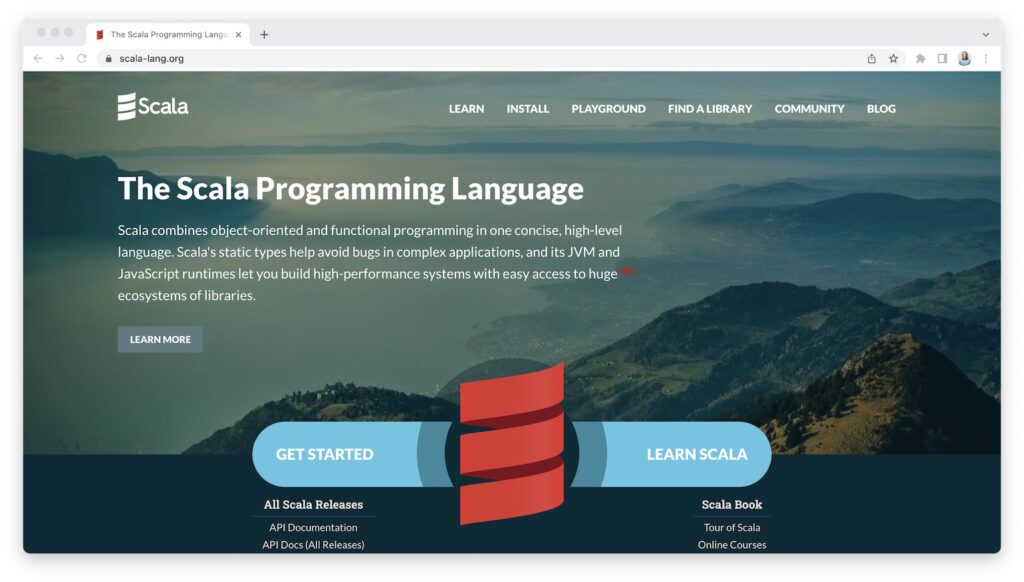What is Scala? Since the Scala programming language isn’t one of the most famous right now, you may not know much about Scala computing.
In short, the Scala language is both an object-oriented programming and functional programming language that was originally created to solve problems with programming in Java. The name “Scala” is a portmanteau of “scalable” and “language,” which means it can grow with any project and can be scaled for large enterprise programs.
In this post, I’ll cover more about what Scala is, examples of what Scala is used for, how it works, the differences in Scala vs Java, and where to learn Scala programming for beginners.
Table of Contents
- What Is Scala Programming Language?
- What Is Scala Used For?
- Why Learn Scala?
- Scala vs Java, Kotlin, Clojure, etc.
- 5 Online Courses to Learn Scala
- FAQs
What Is Scala Programming Language?
Scala is a general-purpose programming language that runs on Java Virtual Machine (JVM). Martin Odersky began designing Scala in 2001 at the École Polytechnique Fédérale de Lausanne (EPFL) in Lausanne, Switzerland. It was released publicly in early 2004.

Scala programming is interoperable with Java code, which means Java and Scala stacks can be freely mixed. Scala computing can accommodate libraries in either language.
What makes it so unique is that Scala object-oriented programming and Scala functional programming capabilities are mixed in a powerful hybrid language design. Most languages are either object-oriented or functional, so programming in Scala is very different in that way.
How Does Scala Work?
Scala uses a syntax called “curly-brace,” which is similar to the language C.
As a basic example, this is what Hello World looks like in Scala code:
object HelloWorld extends App {
println("Hello, World!")
}.To learn a lot more about how Scala works, you’d want to take a course to learn Scala basics (I’ll recommend some below!).
☝️ Back to the table of contents
Start coding now
Stop waiting and start learning! Get my 10 tips on teaching yourself how to code.
What Is Scala Used For?
What is Scala programming language used for? Turns out, it has quite a few applications!
📱 Since Android applications are written in Java, it means that Scala can be used for Android development, especially when a functional approach is preferred.
🖥️ It can also be used to code programs that run in web browsers, similar to JavaScript. Scala.js, for example, is a Scala compiler that compiles to JavaScript, making it possible to write Scala programs that can run in web browsers or Node.js
📊 Scala is also often used in data science. In fact, Python, R, and Scala are the common choices for data scientists and machine learning engineers. This is because Scala can be used in conjunction with Apache Spark in order to deal with a large volume of data (aka Big Data).
☝️ Back to the table of contents
Why Learn Scala? Popularity & Demand for Scala Jobs
According to the TIOBE index of programming language popularity, Scala is #36 as of March 2022, which is lower than a lot of popular languages like Python, Java, etc. But that doesn’t mean it isn’t worth learning! In fact, specializing in a less popular language can increase your competitiveness in the market.
There are currently 28,363 related Scala jobs on Indeed.com. Scala programming skills aren’t the only thing you’ll need for most of these roles, but they are mentioned in the descriptions.

💰 Since these jobs are a little more specialized, they can also be quite lucrative. A Scala developer earns $139,292 /year on average.
921 companies reportedly use Scala in their tech stacks according to StackShare, including Twitter, Coursera, The New York Times, and Accenture.
☝️ Back to the table of contents
Scala vs Java, Kotlin, Clojure, etc.
As mentioned earlier, Scala is only #36 in popularity, so it’s not as popular as Java (#3), Python (#1), Kotlin (#31), or Go (#13). Let’s look at a few differences between programming in Scala vs similar languages.
Scala vs Java
Unlike Java, Scala has many features of functional programming languages like Scheme, Standard ML, and Haskell, including currying, immutability, lazy evaluation, and pattern matching.
Scala has the same compiling model as Java and C#, which means that Scala code can call Java libraries. Plus, Scala code can actually be decompiled into readable Java code.
Scala also has a lot of syntactic flexibility compared with Java. For example, semicolons in Scala are unnecessary.
Scala vs Groovy & Clojure
Scala is also often compared with Groovy and Clojure, two other programming languages also using the JVM. The primary difference is that Scala is statically typed, while both Groovy and Clojure are dynamically typed.
Scala vs Kotlin
Kotlin is also a language for the JVM that is statically typed like Scala. However, compared to Kotlin, Scala programs can be less efficient than object-oriented Java code in terms of memory management and CPU usage.
☝️ Back to the table of contents
5 Online Courses to Learn Scala
Ready to learn Scala programming language skills? These five courses are a great place to learn Scala language basics and beyond.
Disclosure: I’m a proud affiliate for these courses. If you buy a course through these links, I may get a small commission for referring you. Thanks!
- Introduction to Scala on DataCamp: In this course, you’ll learn the basics of Scala, including syntax and style, focusing on the most commonly used features in the Scala standard library. Along the way, you’ll write Scala code for a real program that plays a computer version of the popular card game Twenty-One.
- Scala: Getting Started on Pluralsight: This course teaches you enough of the basics of Scala to enable you to start writing less boiler-plate code and more business code. Topics covered include the REPL, pattern matching, recursion, and much more.
- Functional Programming in Scala Specialization on Coursera: In this 5-course Scala Specialization, you’ll start by learning the basic building blocks of the functional paradigm and go all the way through to building a large data-intensive application using real-world data. This is a bit more of an intensive course that will take approximately 7 months to complete (suggested pace of 7 hours/week).
- Scala Essential Training on LinkedIn Learning: This course starts with the basics of type inference, variables, loops, functions, and operators and then covers more advanced topics in Scala like pattern matching, classes, fields, methods, objects, and more.
- Scala & Functional Programming Essentials | Rock the JVM on Udemy: In this course, you’ll learn the basics of Scala functional programming by writing 3,000+ lines of Scala code yourself, with guidance, through 100+ examples and exercises.
I always recommend taking free or cheap beginner courses to see if you mesh well with a language before deciding if you’d like to pursue it further.
☝️ Back to the table of contents
Learning Scala FAQs
Let’s finish up by covering a few common questions about learning Scala programming!
Is it difficult to learn Scala?
If you already know Java, learning Scala will be a lot easier. However, if you’re new to programming in general, learning Scala will be about at the same level as learning Java, C++, or any other popular programming language.

Should I learn Java before Scala?
It’s up to you! It depends on your goals, including what kind of job you want and what kinds of projects you’d like to work on. However, learning Scala will make it easier to learn Java, and vice versa, so you can always learn both!
Is Scala similar to Python?
Both are high-level programming languages with simple and concise syntax. However, there are plenty of differences in Scala vs Python. Scala is a statically typed language, making it easier to find compile-time errors, while Python is a dynamically typed language. Python is also a lot more popular and has a bigger community. Python has libraries for machine learning and proper data science tools and Natural Language Processing (NLP), while Scala does not.
Want to master Python?
Then download my list of favorite Python learning resources.
☝️ Back to the table of contents
So, there you have the basics of the Scala language. It’s an excellent flexible language that can be used for a lot of different things. If you’re interested in checking it out, start with one of the courses above and take it from there!

